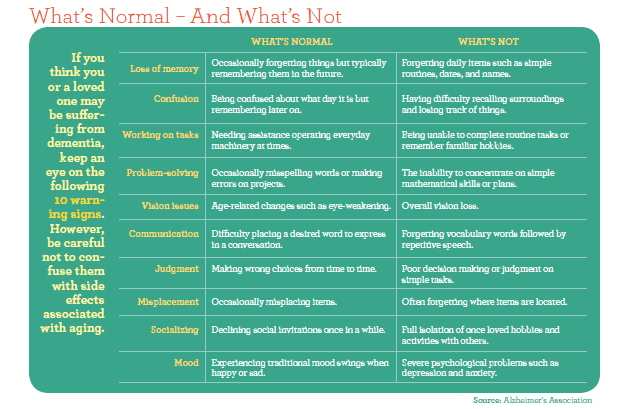So you’re getting older and you’ve lost your keys again. Could you be losing your memory? Here’s how to know when you have cause for concern.
BY MALLORIE ANN INGRAM
Have you ever bumped into an old friend whose name escaped your mind? What about forgetting how to accomplish a task you’ve done for ages? The former could be a mere sign of aging. But if the latter example describes your day-to-day routine, it’s possible you may be suffering from dementia.
The Alzheimer’s Association defines dementia as “a decline in mental ability severe enough to interfere with daily life.” Many think it’s a disease, but it’s actually a term used to describe a set of symptoms – namely, declines in memory or other thinking skills. However, Alzheimer’s disease is the most common type of dementia, accounting for an estimated 60 to 80% of cases.
Dementia is both a difficult topic and one often misunderstood. On the one hand, it’s safe to assume occasional bouts of forgetfulness are a side-effect of more candles on the cake. But on the other, you don’t want to fall victim to denial if there really could be a problem. If you or someone you love is truly suffering from dementia, it’s crucial to catch the signs early so that you can form a plan of action as soon as possible.
Understanding Signs Of Dementia
One hallmark of dementia is that it is progressive, meaning its symptoms begin subtly and worsen over time. And while dementia affects everyone differently, it typically impairs at least two of the following:
- Memory
- Communication & Language
- Focus & Attention
- Reasoning & Judgment
- Visual Perception



“With dementia, you have to look at the whole picture,” explains Alisha Landes, regional director of healthcare operations at Independent Healthcare Properties & Morning Pointe Senior Living. “Does the person have other signs besides memory loss? Has their mood changed? Has it been difficult for them to do normal tasks or find the right word? If you are a caregiver or family member of the person, you are going to notice more than one symptom. And as dementia progresses, these symptoms will become more severe.”
“Dementia involves extreme forgetfulness,” says Brenda Hixon, executive director of The Terrace at Mountain Creek. “As opposed to forgetting the keys here and there, it looks more like forgetting where you are, forgetting whether or not you just ate, or forgetting to put your shoes on before going outside.”
“A person with age-related memory loss will typically remember the information she forgot at a later time, whereas a person with dementia may not,” she continues. “Also, a person with normal age-related memory loss can follow verbal or written instruction without difficulty, whereas a person with dementia will find this more and more difficult as time goes on.”
“It becomes a real problem when you get to the point where something is a repeat thing, for example, misplacing something over and over again,” says Dr. Michael Crowe, on-site physician at Life Care Center of Collegedale. “Sometimes things you have done before – like taking care of a checkbook or following a recipe – become difficult or you start putting things in weird places. In other cases, you may not be able to call things by their names, or you may occasionally forget where you are.”
“We’ve all misplaced keys or forgotten where we parked our car, but when these things start interfering with everyday life – when they become disruptive – that’s when there may be cause for concern,” Landes adds.
What To Do If You Notice Signs



On-Site Physician, Life Care Center Of Collegedale
“If you are a caregiver or a family member of someone you suspect has dementia and you’re wondering, ‘Is this outside of the bounds of what’s normal?’ you should encourage that person to see a professional,” says Landes.
“Anyone suspected of having dementia needs to be tested by a physician as soon as possible,” Dr. Crowe says.
A physician can perform a series of tests to assess your loved one’s condition. He or she will likely use a screening tool called BIMS, which stands for “Brief Interview for Mental Status.” “You can actually get BIMS right off the computer if you’re curious,” says Dr. Crowe. “It involves asking the person to repeat a series of three words, asking him or her the year, month, day, and simple questions like, ‘what would you put on your foot?’ A person’s BIMS score can indicate whether he or she needs to see a specialist.”
He adds that it can be helpful to give the physician a heads up about the situation. “If the physician knows what’s going on, he or she can have a plan of action before walking in the room,” says Dr. Crowe.
Because there is a mood component to dementia, it can sometimes be difficult to coax a loved one to go to an appointment. For these cases, Dr. Crowe offers this advice: “One way is to say, ‘Mom, or Grandma, it’s time for a regular visit. You should go see your doctor,” he says. “If they absolutely refuse, you can help them develop a healthy lifestyle to offset the condition, make things safe at home, try to develop a routine, and more. But through the whole process, it’s important to remember the dignity of the person.”


Why Early Detection Is Important



Regional Director of Healthcare Operations,
Independent Healthcare Properties & Morning Pointe Senior Living
Taking action during the initial stages of development will allow you, your loved one, and your loved one’s doctor to develop a comprehensive treatment plan. Although there is still no cure for dementia, early detection can improve the overall outcome of the condition, allowing time for:
Starting Medication If medications are needed, starting them early allows a patient to get their maximum effect. “So far, five drugs have been approved by the FDA which may temporarily slow the progression of Alzheimer’s disease for some patients,” Hixon explains.
Finding Support “I encourage caregivers and family members to seek out support as early as possible, not only for their loved one’s sake, but also for their own sake,” says Landes. “Ten years ago, we didn’t have the resources for caregivers that we have now, and these can take the load off and give them relief. Caregivers don’t have to go through it alone, and it’s easy to feel alone when taking care of someone.”
Planning For The Future The earlier dementia is detected, the more time you have to make important decisions and plan for the future. “Knowing early gives you time to get paperwork together for medical care and the other decisions that arise as the condition progresses,” says Dr. Crowe.
Don’t wait!
If you think you or someone you love may be suffering from dementia, don’t wait to contact your health care provider. For more information about warning signs of dementia, visit the Alzheimer’s Association online at alz.org.

